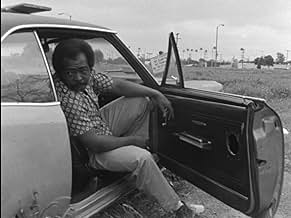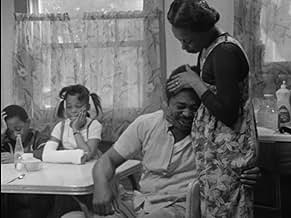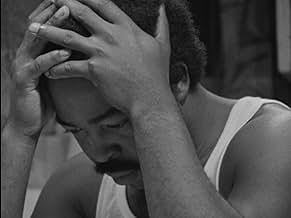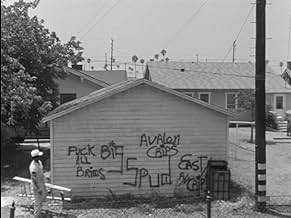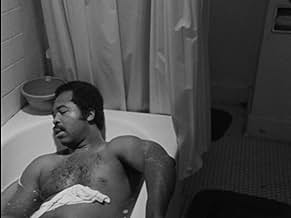Ajouter une intrigue dans votre langueA dramatic look into the life of a family in Watts.A dramatic look into the life of a family in Watts.A dramatic look into the life of a family in Watts.
- Récompenses
- 4 victoires au total
Histoire
Le saviez-vous
- AnecdotesIn 2013, this film was selected by the Library of Congress for preservation in the United States National Film Registry for being "culturally, historically, or aesthetically significant".
- ConnexionsFeatured in Los Angeles Plays Itself (2003)
Commentaire à la une
This movie ends up being less than the sum of its parts - which shouldn't keep you from watching it.
Let's start with the good - indeed, great - parts. Charles Burnett's cinematography is often downright spectacular. The opening sequence, with Charlie looking for a job at the employment office and then, after he doesn't find one, walking slowly back home through the train yard, finally sitting in despair on the tracks, is rivetingly beautiful. Not a word is spoken. But every angle, every shot adds to the mood. It is just masterful. As, subsequently, is the scene of Charlie shaving, and ..., and ..., and ... In all these scenes there is no dialogue. But the black and white images, often accompanied by jazz, are remarkable, and certainly make this movie worth watching.
But then come the negatives.
First, a long sequence of slow scenes like that with no contrasting faster-paced ones eventually hangs heavy on the viewer, or at least this viewer. After the opening scene, we never really see Charlie hunting for a job again. That is unfortunate, because we come to see him as lazy/shiftless after a while. The end of the last scene really emphasizes that. A few more job hunting scenes, done with different pacing, could have given the film more variety as well as reminded us that Charles is, indeed, trying to find work to support his family. (Yes, I know, he is depressed, and that is a real issue and a debilitating one. But so is his wife, and she manages to keep on going.)
Second, the dialogue, also by Charles Burnett, often falls flat. (You can't be first-rate at everything, and Burnett is clearly a first-rate cinematographer.) Perhaps it should have been turned over to someone else. Sometimes I found it stilted and unnatural, sometimes I found it preachy. (The scene in the barber shop is a good example, as is the scene early on with the men sitting around another table talking about ways to make some money.) Sometimes I just wished Charlie (the male lead) had been more honest with his wife. The long scene in the kitchen where he refuses to admit his infidelity to his wife is full of clichés and really leaves him looking like a scumbag. I doubt that was the intention of those making the film.
The acting here is fine to very fine. Nate Hardman expresses so many emotions with just a few glances and gestures, as when he looks at his kids in the kitchen after he gets home from a failed attempt at job hunting and so clearly feels like a failure to them, so clearly is ashamed.
Billy Woodberry's direction is masterful in the wordless slow scenes. He knows just what to show, and how long to show it. If he was telling his actors where to go and how to position themselves, he did a great job. It's very definitely a shame that he did not get to hone his very considerable skills through a string of subsequent films, and so learn to introduce a little variety.
Let's start with the good - indeed, great - parts. Charles Burnett's cinematography is often downright spectacular. The opening sequence, with Charlie looking for a job at the employment office and then, after he doesn't find one, walking slowly back home through the train yard, finally sitting in despair on the tracks, is rivetingly beautiful. Not a word is spoken. But every angle, every shot adds to the mood. It is just masterful. As, subsequently, is the scene of Charlie shaving, and ..., and ..., and ... In all these scenes there is no dialogue. But the black and white images, often accompanied by jazz, are remarkable, and certainly make this movie worth watching.
But then come the negatives.
First, a long sequence of slow scenes like that with no contrasting faster-paced ones eventually hangs heavy on the viewer, or at least this viewer. After the opening scene, we never really see Charlie hunting for a job again. That is unfortunate, because we come to see him as lazy/shiftless after a while. The end of the last scene really emphasizes that. A few more job hunting scenes, done with different pacing, could have given the film more variety as well as reminded us that Charles is, indeed, trying to find work to support his family. (Yes, I know, he is depressed, and that is a real issue and a debilitating one. But so is his wife, and she manages to keep on going.)
Second, the dialogue, also by Charles Burnett, often falls flat. (You can't be first-rate at everything, and Burnett is clearly a first-rate cinematographer.) Perhaps it should have been turned over to someone else. Sometimes I found it stilted and unnatural, sometimes I found it preachy. (The scene in the barber shop is a good example, as is the scene early on with the men sitting around another table talking about ways to make some money.) Sometimes I just wished Charlie (the male lead) had been more honest with his wife. The long scene in the kitchen where he refuses to admit his infidelity to his wife is full of clichés and really leaves him looking like a scumbag. I doubt that was the intention of those making the film.
The acting here is fine to very fine. Nate Hardman expresses so many emotions with just a few glances and gestures, as when he looks at his kids in the kitchen after he gets home from a failed attempt at job hunting and so clearly feels like a failure to them, so clearly is ashamed.
Billy Woodberry's direction is masterful in the wordless slow scenes. He knows just what to show, and how long to show it. If he was telling his actors where to go and how to position themselves, he did a great job. It's very definitely a shame that he did not get to hone his very considerable skills through a string of subsequent films, and so learn to introduce a little variety.
- richard-1787
- 16 janv. 2023
- Permalien
Meilleurs choix
Connectez-vous pour évaluer et suivre la liste de favoris afin de recevoir des recommandations personnalisées
Détails
- Durée1 heure 20 minutes
- Couleur
- Mixage
Contribuer à cette page
Suggérer une modification ou ajouter du contenu manquant

Lacune principale
By what name was Bless Their Little Hearts (1983) officially released in Canada in English?
Répondre

